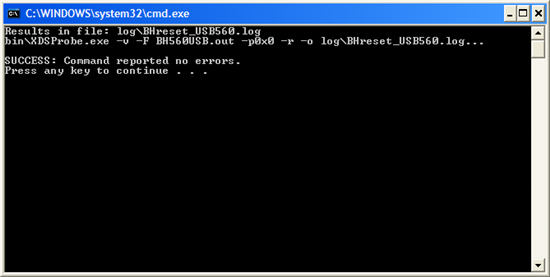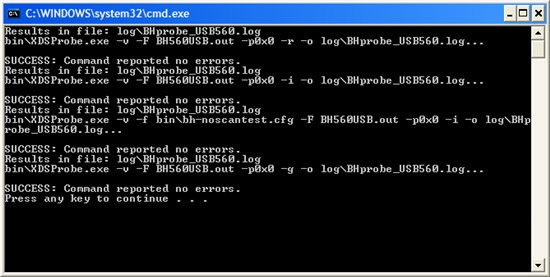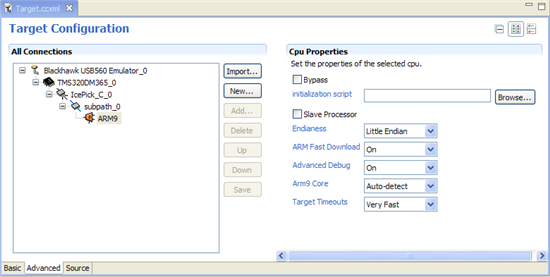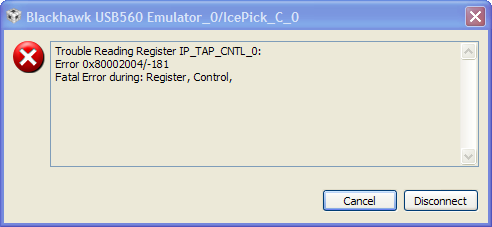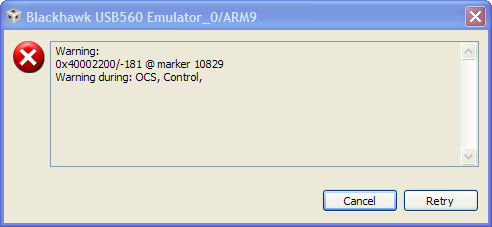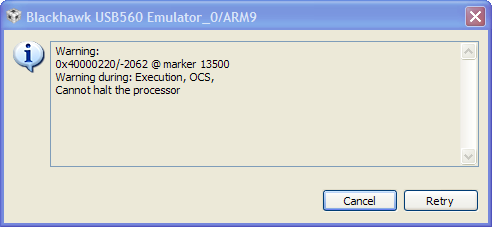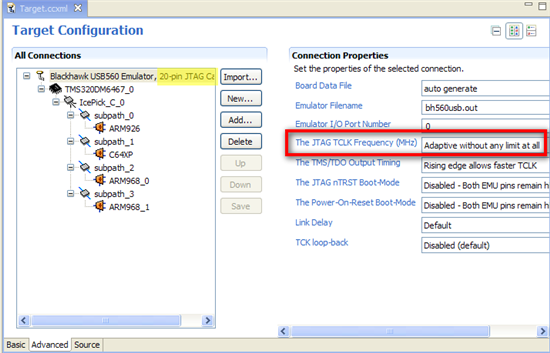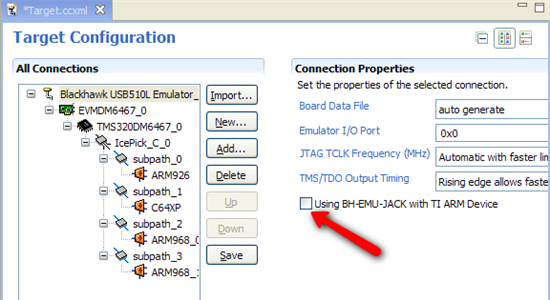I'm embarrassed to say it but I cannot connect to any ARM9 cores using CCS! I've unfortunately spent over a full day trying many combinations of CCS 3.3 SR12, CCS 4.1.2, BH USB510L, BH USB560, with/without SD adaptive clocking boards, with/without gel file, DM6467, DM6467T, DM365, and on and on. No success! If I stick an "old faithful" board like the 6713 in there I can connect immediately with all combinations listed.
What on earth has happened?
Let's focus on a specific setup: DM365 EVM, BH USB560 (original version, not the 'm' or the 'bp'), SD 14-to-14 pin converter with SW1.1=ON and SW1.2=OFF (i.e. "XDS560 mode").
Step 1: with board powered off I attach the adapter and emulator.
Step 2: Power on board.
Step 3: Run BH diagnostic BHreset_560.bat.
Step 4: Run BHprobe_560.bat
Step 5: Configure CCS 4.1.2 for this setup.
Step 6: Launch Debug session and connect. Two error boxes appear:
Step 7: Disconnect and terminate debug session.
Step 8: Try BHreset_560.bat again:
BHreset_USB560.log said:
**************************************************
BHProbe 5.01: Blackhawk USB560 JTAG Emulator
**************************************************
Wed 05/12/2010-15:21:17.45
bin\XDSProbe.exe -v -F BH560USB.out -p0x0 -r -o log\BHreset_USB560.log
-----[Print the reset-command software log-file]-----------------------------
This utility has selected an XDS560 class product.
This utility will load the program 'BH560USB.out'.
This utility will operate on port address '0'.
The controller does use a programmable FPGA.
The old VHDL code has a version number of '1544' (0x0608).
The new VHDL code has a version number of '1544' (0x0608).
An error occurred while hard opening the controller.
-----[An error has occurred and this utility has aborted]--------------------
This error is generated by TI's USCIF driver.
The value is '-181' (0xffffff4b).
The title is 'SC_ERR_CTL_NO_TRG_CLOCK'.
The explanation is:
The controller has detected a dead JTAG clock.
The user must turn-on or connect the JTAG clock for the target.
Done.
Step 9: Try BHprobe_560.bat again:
BHprobe_USB560.log said:
Wed 05/12/2010-15:22:29.73
****************************************************************************************************
TEST 1 - RESET
****************************************************************************************************
**************************************************
BHProbe 5.01: Blackhawk USB560 JTAG Emulator
**************************************************
Wed 05/12/2010-15:22:29.82
bin\XDSProbe.exe -v -F BH560USB.out -p0x0 -r -o log\BHprobe_USB560.log
-----[Print the reset-command software log-file]-----------------------------
This utility has selected an XDS560 class product.
This utility will load the program 'BH560USB.out'.
This utility will operate on port address '0'.
The controller does use a programmable FPGA.
The old VHDL code has a version number of '1544' (0x0608).
The new VHDL code has a version number of '1544' (0x0608).
An error occurred while hard opening the controller.
-----[An error has occurred and this utility has aborted]--------------------
This error is generated by TI's USCIF driver.
The value is '-181' (0xffffff4b).
The title is 'SC_ERR_CTL_NO_TRG_CLOCK'.
The explanation is:
The controller has detected a dead JTAG clock.
The user must turn-on or connect the JTAG clock for the target.
Done.
****************************************************************************************************
TEST 2 - SCAN
****************************************************************************************************
**************************************************
BHProbe 5.01: Blackhawk USB560 JTAG Emulator
**************************************************
Wed 05/12/2010-15:22:31.76
bin\XDSProbe.exe -v -F BH560USB.out -p0x0 -i -o log\BHprobe_USB560.log
-----[Print the controller-open software log-file]---------------------------
This utility has selected an XDS560 class product.
This utility will load the program 'BH560USB.out'.
This utility will operate on port address '0'.
The controller does use a programmable FPGA.
An error occurred while hard opening the controller.
-----[An error has occurred and this utility has aborted]--------------------
This error is generated by TI's USCIF driver.
The value is '-181' (0xffffff4b).
The title is 'SC_ERR_CTL_NO_TRG_CLOCK'.
The explanation is:
The controller has detected a dead JTAG clock.
The user must turn-on or connect the JTAG clock for the target.
Done.
****************************************************************************************************
TEST 3 - SCAN2
****************************************************************************************************
**************************************************
BHProbe 5.01: Blackhawk USB560 JTAG Emulator
**************************************************
Wed 05/12/2010-15:22:33.68
bin\XDSProbe.exe -v -f bin\bh-noscantest.cfg -F BH560USB.out -p0x0 -i -o log\BHprobe_USB560.log
-----[Print the controller-open software log-file]---------------------------
This utility has selected an XDS560 class product.
This utility will load the program 'BH560USB.out'.
This utility will operate on port address '0'.
The controller does use a programmable FPGA.
An error occurred while hard opening the controller.
-----[An error has occurred and this utility has aborted]--------------------
This error is generated by TI's USCIF driver.
The value is '-181' (0xffffff4b).
The title is 'SC_ERR_CTL_NO_TRG_CLOCK'.
The explanation is:
The controller has detected a dead JTAG clock.
The user must turn-on or connect the JTAG clock for the target.
Done.
****************************************************************************************************
TEST 4 - DATA
****************************************************************************************************
**************************************************
BHProbe 5.01: Blackhawk USB560 JTAG Emulator
**************************************************
Wed 05/12/2010-15:22:35.76
bin\XDSProbe.exe -v -F BH560USB.out -p0x0 -g -o log\BHprobe_USB560.log
-----[Print the controller-open software log-file]---------------------------
This utility has selected an XDS560 class product.
This utility will load the program 'BH560USB.out'.
This utility will operate on port address '0'.
The controller does use a programmable FPGA.
An error occurred while hard opening the controller.
-----[An error has occurred and this utility has aborted]--------------------
This error is generated by TI's USCIF driver.
The value is '-181' (0xffffff4b).
The title is 'SC_ERR_CTL_NO_TRG_CLOCK'.
The explanation is:
The controller has detected a dead JTAG clock.
The user must turn-on or connect the JTAG clock for the target.
Done.
Step 10: Power cycling the board (not the emulator) puts the emulation back in a state where I can successfully repeat this whole process over again.
If I try doing the same procedure without the SD adapter I have related but different results. For example CCS only gives one error:
In this scenario BHreset_560.bat and BHprobe_560.bat continue working after I disconnect from CCS. FYI, I have already RMA'd FOUR of these adapter boards to Spectrum Digital under the suspicion they were causing the problem. On some of the previous boards I could not ever get BHreset_560.bat to work so it seems like these boards are "better" but I still can't get a fully working solution!!!!


